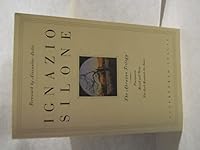- Welcome to FictionDB, Guest
- | My Account
- | Help

The Abruzzo Trilogy: Fontamara, Bread and Wine, the Seed Beneath the Snow — Ignazio Silone
buy the book from amazon
Paperback editions:
Hardcover editions:
eBook editions:
Audio editions:
Large Print editions:
Browse Similar Books at Amazon
Literature & Fiction->Literary
Literature & Fiction->Short Stories & Anthologies->Short Stories
Literature & Fiction->Genre Fiction->Historical->Short Stories & Anthologies->Short Stories
Description
The first novel in the series, Fontamara, is a political fable that portrays the bitter trials of the villagers of Pescina as they battle with landowners who have appropriated their only source of water. First published from his exile in Zurich in 1933, and banned in his own country, the novel was translated into twenty languages and won Silone instant international literary fame.
Silone's masterpiece, Bread and Wine, introduces the semi-autobiographical character Pietro Spina, an anti-Fascist revolutionary who returns to his homeland after fifteen years in exile. He seeks refuge among the Abruzzo peasants by posing as the priest Don Paolo Spada.
Pietro's story continues in The Seed Beneath the Snow, Silone's personal favorite in the trilogy. Pietro Spina flees again and, with the police in close pursuit, is taken in by his grandmother Donna Maria Vincenza. Though comfortably settled in Italian bourgeois society, she jeopardizes her own life in order to protect him.
CERTAIN CONTENT THAT APPEARS ON THIS PAGE COMES FROM AMAZON. THIS CONTENT IS PROVIDED ‘AS IS’ AND IS SUBJECT TO CHANGE OR REMOVAL AT ANY TIME.

 Amazon UK
Amazon UK